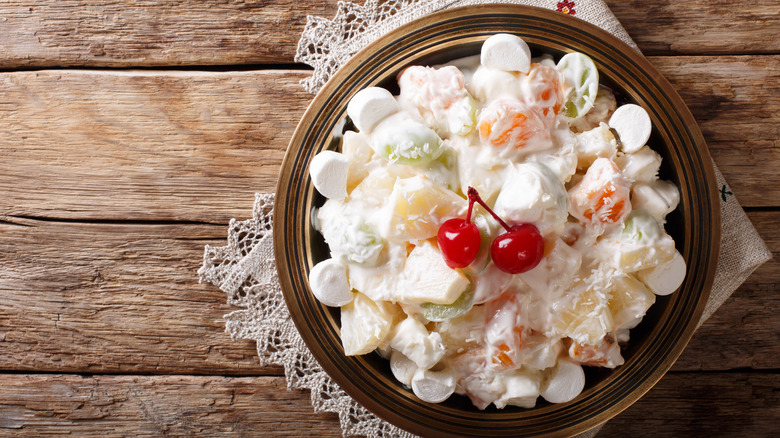This Is Where The Ambrosia Salad's Name Comes From
Ambrosia dessert (also called salad) triggers derision and debate, yet the fluffy medley remains one of the world's ten most popular fruit salads, a potluck staple, and a cherished Southern tradition, according to Taste Atlas. Calorically loaded and easy to make, Los Angeles Times reports the dish "closely treads the line between melange and mess" so much, in fact, that many restaurateurs assert ambrosia is too old-fashioned, costly, and impractical to serve. For some like Daniel Davis, the dish provokes disdain, with hesitant spoonfuls chased by immediate gulps of water (per NPR). Yet for others, ambrosia is the perfect offering for summer gatherings, a brightly-colored presentation that adds a touch of festivity to table spreads (via The Six Figure Dish).
Depending on how the dish is prepared, ambrosia can lean hard into dessert territory with whipped cream, marshmallows, and maraschino cherries; recipes can also be built more lightly with fruits, yogurt, and nuts, according to the Alabama Chanin Journal. And, while SBS maintains ambrosia salad is indisputably American, the name of the dish itself can be traced back to antiquity.
Intended for Greek gods only
The colorful dessert salad isn't the only food bearing the ambrosia title, according to ACIT group; there's also a semi-hard Swedish cow cheese with the same name. According to Greek Mythology, however, ambrosia was neither salad, cheese, nor any other food meant for mortal consumption; ambrosia was a sustenance strictly reserved for the gods. It was a nectar that could provide immortality and turn blood into a golden substance that could kill — maybe this explains Davis' extreme aversion to the dish.
One Greek myth tells how Zeus fed ambrosia to his son Apollo to ensure mortality after Apollo's mother died. The warrior Achilles' mother, too, tried to give her son the gift of everlasting life — yet her ritual was interrupted, and her son was made immortal in every area except for his infamous heel (per Greek Boston). While we can't ensure eternal existence from an ambrosia salad, we do suggest wading into the world of simple fruit salads if you're unsure about serving this sugary treat.

